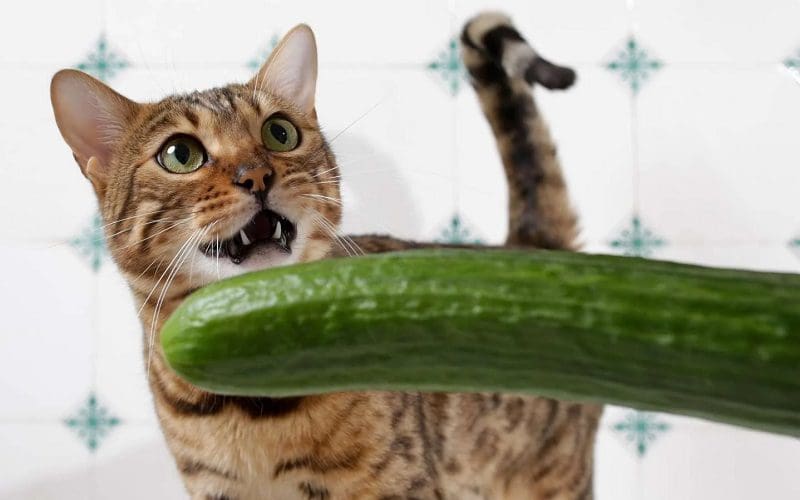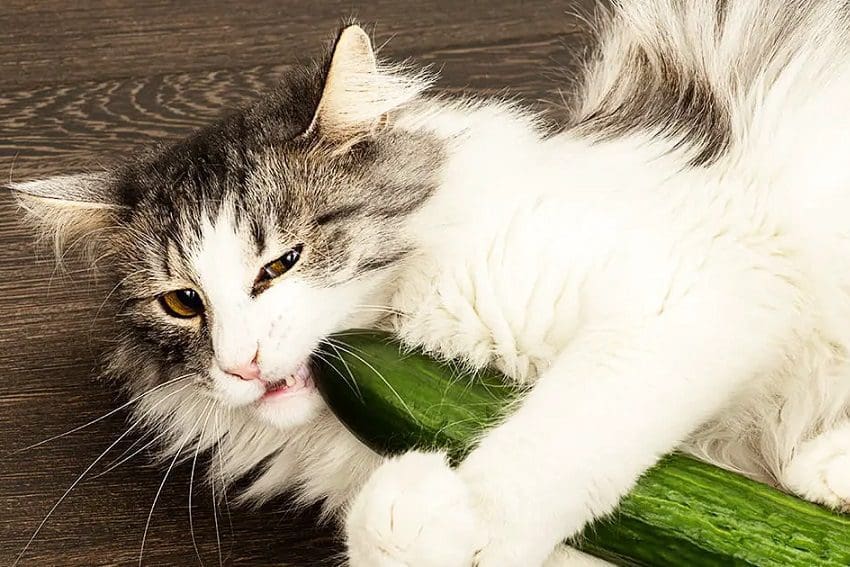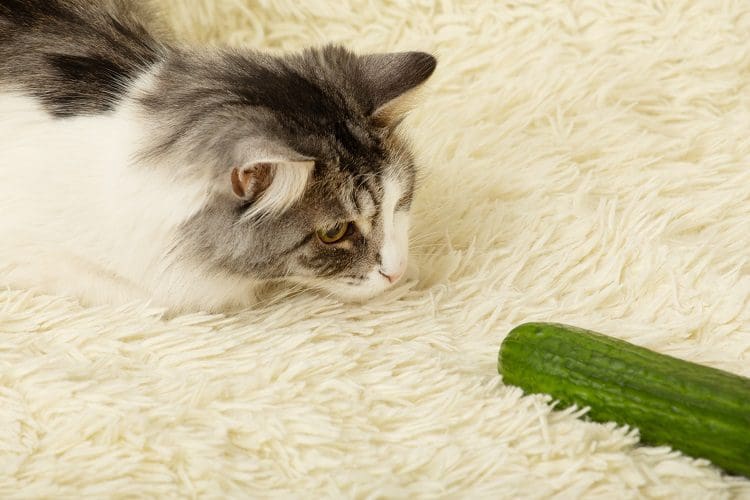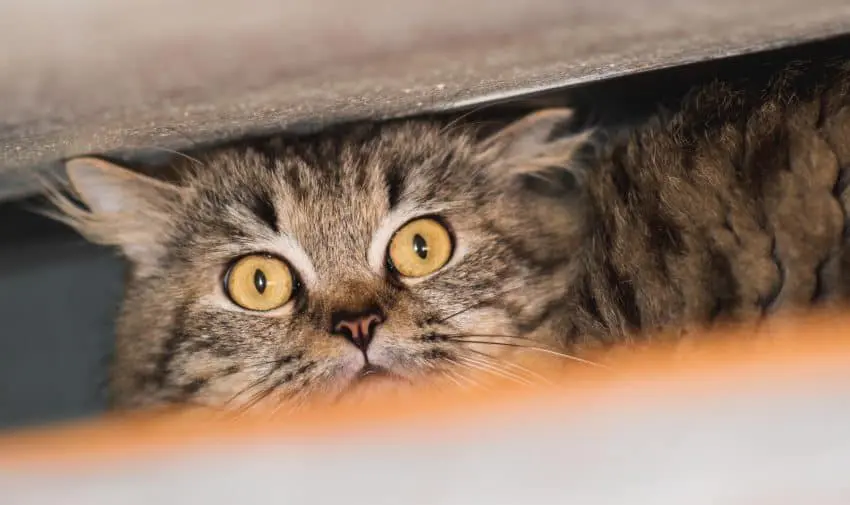Last Updated: 6 months ago
It’s a common sight to see cats and cucumbers together in funny videos, but why are cats afraid of cucumbers?
It may seem like an odd fear, but it’s something that many cats experience. If you’ve noticed that your cat is afraid of cucumbers, you’re not alone.
A cat scared of cucumbers might make for a funny video, but it’s not really something to laugh about!
Let’s find out why.
Why are domestic cats scared of cucumbers?

Domestic cats are naturally curious creatures, and when they encounter something unfamiliar in their environment, it can startle them.
Cucumbers resemble snakes to some degree with their long green bodies and the way they slither across the floor.
This similarity triggers a fear response in cats that is similar to how they would react if they encountered an actual snake.
The sudden appearance of a cucumber can cause cats to jump back or even run away from it due to this fear response.
Additionally, the texture of cucumbers may be unpleasant for cats as well, since many animals have sensitive noses and paws that don’t like certain textures or smells.
All these factors combined make domestic cats scared of cucumbers!
Are all cats afraid of cucumbers?

No, not all cats are afraid of cucumbers. In fact, some cats may even be curious about them or show no reaction at all.
This phenomenon is known as “cucumber phobia,” and it has been observed in many different species of animals, including cats.
The fear that some cats have when they encounter a cucumber likely stems from the suddenness with which it appears and its unfamiliar shape.
Cats are naturally cautious creatures, and this can cause them to become startled by something new or unexpected in their environment.
Additionally, the green color of the cucumber could remind a cat of a snake, another creature that they would instinctively want to avoid.
While there are certainly some cats who experience fear when presented with a cucumber, this does not mean that all felines will react negatively to this vegetable.
It is important for pet owners to observe their own cat’s behavior around cucumbers so they can determine how best to keep their furry friend safe and comfortable in any situation.
The Reasons Why Some Cats May Be Scared of Cucumbers

Many cats are afraid of this common vegetable due to its unfamiliar smell and shape.
Cats are naturally curious creatures, but when it comes to cucumbers, they can be quite skittish.
The unfamiliar scent may also cause them to feel uneasy or threatened.
If your cat has had any bad experiences with cucumbers in the past, such as being startled by one, then this could contribute to their fear too.
It’s important to remember that cats don’t understand why we put vegetables near them and can become very anxious when something unexpected happens like this.
If you want your cat to eat cucumbers as treats, there are some things you can do to help ease their anxiety around them:
- Avoid placing cucumbers near your cat while they’re eating or sleeping. This will reduce the chances of startling them and causing further distress.
- Keep an eye on how your cat reacts when they come into contact with a cucumber. If they seem frightened, try distracting them with toys or treats.
- Introduce small amounts of cooked or raw diced-up pieces gradually over time. Allow your pet to get used to the taste and texture slowly.
- Don’t force interaction between your pet and the vegetable; let it happen at their own pace.
- Talk calmly and reassuringly while introducing new foods. Letting them know everything is okay will help keep stress levels low for both you and your pet.
It’s important to remember that every animal responds differently, so what works for one may not work for another!
With patience, understanding, positive reinforcement, plenty of treats (of course!), and love, hopefully soon enough even the most fearful feline will learn that there’s nothing scary about those strange green veggies after all!
Why Stressing Out Your Cat for Fun Is a Bad Idea

We all know that feeling of anxiety and fear. That heart-pounding, sweaty-palmed, can’t-catch-your-breath feeling.
And unfortunately, our feline friends are not immune to these emotions. In fact, cats are particularly prone to stress and anxiety.
There are a number of reasons why cats may experience anxiety or fear.
One common trigger is the sudden change in their environment, such as a move to a new home, the addition of a new pet or baby to the family, or even something as seemingly innocuous as a new piece of furniture.
Cats are also highly sensitive to changes in routine, so things like a vacation or a change in work hours can cause stress.
But it’s not just big changes that can upset a cat. Even small, everyday things like a loud noise or a strange person can trigger a fear response.
For example, a cat is scared of cucumbers.
Unfortunately, when cats are stressed or afraid—especially if they experience chronic stress—they often exhibit some very undesirable behaviors.
Some of these strain relationships between cat parents and their fur baby, such as urinating outside the litter box, scratching furniture, or becoming aggressive.
In extreme cases, cats may even try to escape from their homes. This means that stressing out your cats for fun is a big no-no.
Even if it makes for a funny viral video, scaring your cat is not something that you should do. It is bad for their emotional and mental health.
How to Help a Stressed-Out Kitty

Here are some tips from animal experts to relieve a cat’s stress.
First, it’s important to try to identify the source of your cat’s anxiety or fear.
If there’s something in the environment that’s causing the stress, like a new piece of furniture, try to provide a safe space for your cat to retreat to, like a cat tree or a cozy bed.
You should also try to stick to a regular routine as much as possible and give your cat plenty of attention and affection.
If you think your cat may be experiencing separation anxiety, consider investing in a puzzle feeder or toy to keep them occupied while you’re away.
Finally, if your cat’s anxiety is severe, you may want to talk to your veterinarian about possible medication options.
No one likes to see their beloved cat in distress. By understanding the causes of anxiety and fear in cats and taking some simple steps to help, you can make sure your kitty stays happy and healthy.
Conclusion
A cat scared of cucumbers in that social media post might be funny for humans, but not for the cat.
Scaring your cat might cause unnecessary stress and anxiety, which in turn can develop behavioral problems.
A happy cat is a stress-free cat! Stop scaring cats for fun and laughter. Give them cucumbers as treats, and reduce the things they are scared about.
